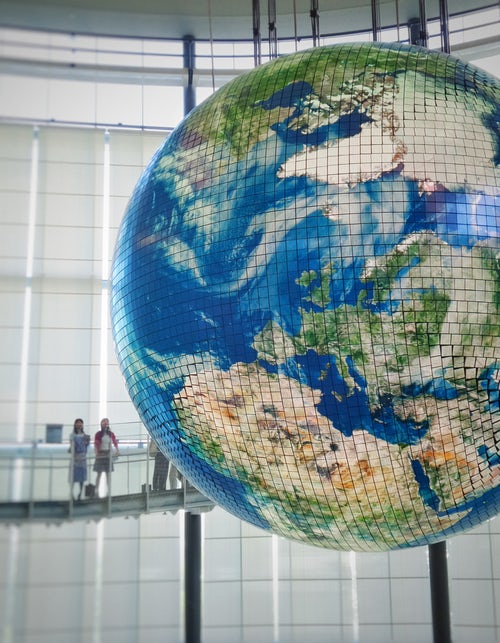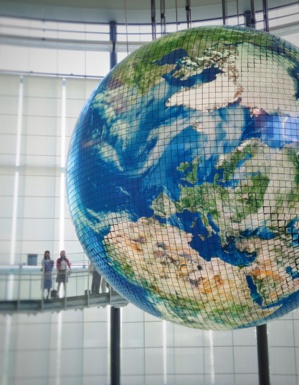According to the information provided by the United Nation, there is an annual consumption of “five trillion grocery bags” on a global scale, most of which turn into “plastic garbage” that are barely recycled, whereby generating a massive amount of plastic trash in the environment.
The United Nations published a report for the “International Environment Day”, wherein it warned that if things moved at their present pace, by the time we enter the mid-century, “12 billion tonnes of plastic trash” could be sweeping across the planet. The U.N. Environment Head, Erik Solheim said:
“Our oceans have been used as a dumping ground, choking marine life and transforming some marine areas into a plastic soup”.
“In cities around the world, plastic waste clogs drains, causing foods and breeding disease. Consumed by livestock, it also finds its way into the food chain.”
Mostly, the “single-use items” like cutlery, straws or bags either turn into landfill or clog the waterways. In fact, the “five trillion plastic bags” that are used yearly is equivalent to almost “10 million plastic bags per minute”. While report adds:
“If tied together, all these plastic bags could be wrapped around the world seven times every hour.”
Around 79% of the “plastic ever made” has eventually landed in dump-yards, as most remained un-destroyed despite attempts of “recycling and other initiatives for curbing the use of plastic, while a negligent amount were only reused. Statistics show that only 9% of “nine billion tonnes of plastic the world has ever produced” were recycled, while a little over 12% ended up in the incinerator.
Once, the plastic lands as in the waterways, oceans or in landfill, for these being the alternate “resting place for the world's plastic trash”, the decomposition process of these trashes continues for “thousands of years”. Sewer clogging caused by plastic trash across the developing countries can be responsible for propagating diseases, while of the plastics actually end up in the animals’ stomachs, remarked the United Nations.
Dead cows in India had plastic in their stomach and a whale found in Thailand consumed waste bags and met with a painful end. While, the report also added that:
“Garbage floating at sea costs fishing, shipping and tourism industries in Asia-Pacific $1.3 billion a year”.
Over sixty countries have imposed bans or introduced levies on “single-use plastic items”, informed the United Nations. However, better incentives along with improved “waste management” are required to drive a change in the buying habits of the consumers which need to be supported by “research into alternative materials” for yielding “any real change”. According to the report:
“To meet the rising tide of plastics, we urgently need strong government leadership and intervention”.
References:
naharnet.com
The United Nations published a report for the “International Environment Day”, wherein it warned that if things moved at their present pace, by the time we enter the mid-century, “12 billion tonnes of plastic trash” could be sweeping across the planet. The U.N. Environment Head, Erik Solheim said:
“Our oceans have been used as a dumping ground, choking marine life and transforming some marine areas into a plastic soup”.
“In cities around the world, plastic waste clogs drains, causing foods and breeding disease. Consumed by livestock, it also finds its way into the food chain.”
Mostly, the “single-use items” like cutlery, straws or bags either turn into landfill or clog the waterways. In fact, the “five trillion plastic bags” that are used yearly is equivalent to almost “10 million plastic bags per minute”. While report adds:
“If tied together, all these plastic bags could be wrapped around the world seven times every hour.”
Around 79% of the “plastic ever made” has eventually landed in dump-yards, as most remained un-destroyed despite attempts of “recycling and other initiatives for curbing the use of plastic, while a negligent amount were only reused. Statistics show that only 9% of “nine billion tonnes of plastic the world has ever produced” were recycled, while a little over 12% ended up in the incinerator.
Once, the plastic lands as in the waterways, oceans or in landfill, for these being the alternate “resting place for the world's plastic trash”, the decomposition process of these trashes continues for “thousands of years”. Sewer clogging caused by plastic trash across the developing countries can be responsible for propagating diseases, while of the plastics actually end up in the animals’ stomachs, remarked the United Nations.
Dead cows in India had plastic in their stomach and a whale found in Thailand consumed waste bags and met with a painful end. While, the report also added that:
“Garbage floating at sea costs fishing, shipping and tourism industries in Asia-Pacific $1.3 billion a year”.
Over sixty countries have imposed bans or introduced levies on “single-use plastic items”, informed the United Nations. However, better incentives along with improved “waste management” are required to drive a change in the buying habits of the consumers which need to be supported by “research into alternative materials” for yielding “any real change”. According to the report:
“To meet the rising tide of plastics, we urgently need strong government leadership and intervention”.
References:
naharnet.com






